- Home
- Marthe Jocelyn
How It Happened in Peach Hill Page 5
How It Happened in Peach Hill Read online
Page 5
Son crossed over in the Great War.
“Yes, ma’am.”
“Whatever next? A miracle in Peach Hill. I always knew you were a special child.”
“Hello, Mrs. Ford.” You never had a good thing to say about me, you old liar, except to show pity.
I spent every penny Mama had given me, knowing it was a rare opportunity. I bought a tin of talcum powder from the chemist—“June Rose”—and a paintbox, and a new book called Black Beauty. I lingered outside the window of Laraby Jewelry & Pawn Shop, always curious to see new wares.
But what was that? Sitting there in full view on a blue velvet tray was Mrs. Poole’s bracelet, the one we’d passed about at the séance only last Friday. I would have known it anywhere, with that plum of a ruby. What was it doing here? Had Mr. Poole sold it for some reason?
I tried to treat myself to lunch at Bing’s Café, but Bing’s wife, Sadie, was quick to tell me, “On the house, darling, if you touch my sore knee.”
“Happy to, ma’am. Delicious iced tea.”
I hadn’t decided whether to tell Mama about the bracelet at Laraby’s when I burst in the front door, late in the afternoon, carelessly slamming it behind me. Mama hates a slam, especially when she’s working. This time, it brought her out of the front room with a scary smile pasted on her mouth.
“Why, Annie, dear,” she said. “You’re home.”
Dear? Who was with her? Not a customer, or the parlor door would have stayed shut.
“Come in, dear,” said Mama. “There’s someone here inquiring after your health.”
I peered into the room. It was a woman, wearing a serge suit the color of lilacs. Her hair, faded yellow, was drawn back into a bun. Her hat sat on her knees with pansies popping up all over it.
“This is Mrs. Newman,” said Mama. I recognized the note of poison in her voice. “She is insisting that you attend school, as of tomorrow morning.”
“It’s the law,” said Mrs. Newman. “Not a personal whim.”
My stomach began to churn. This was Mrs. Newman? This perfectly pleasant-looking woman with the silly hat was the shark Sammy had spoken about?
She wanted me to go to school?
Mrs. Newman was looking at me.
“I am overjoyed to have my child recovered,” said my mother, stroking my cheek. “But she has only been well for a matter of hours. How can you imagine she is ready to attend school? She is not yet a normal girl.”
Mrs. Newman’s right eyebrow rose to a suspicious peak.
“She is not educated,” Mama went on. “She has always been near me. Already the town bullies have plagued her. I fear she may have trouble if placed in a classroom with these same cruel children.”
“Indeed, Mrs.—?”
“Madame,” said Mama.
“Indeed, madame. It is my job to obey the law that states that all children under the age of sixteen must attend school. Your daughter is apparently healthy and able. Her lack of learning is not a drawback but a challenge. However, you make an important point, that she is somewhat behind her peers in learning the fundamentals. She will be placed in the first grade under the instruction of Miss Carruthers and will—”
“But I need her at home!” Mama snapped. “She is a great help to me, and—”
“That is of no account. It is precisely to avoid the exploitation of children that the law was devised. The law states that all—”
“Oh, pish the law,” said Mama.
“Excuse me,” I said, so politely that even Mama stopped in surprise. “Mrs. Newman. I’ve been ill, or slow-witted, or, some say, idiotic. I’m not certain what you mean by school, exactly, but if it’s a place where I’m to learn my letters and make some friends, why, it sounds wonderful!”
Mama snorted. I would not look at her. Mrs. Newman’s eyes narrowed to blue slits; she didn’t know she was handing me a ticket to freedom and adventure.
“I will accompany you to school in the morning,” she said. Her gaze slid over my clothing. “You will need to look tidy and clean. Dark skirts are preferable, with a crisp blouse or trim sweater.”
Mama actually snickered. “Crisp” and “trim” were not adjectives that applied to us.
“I don’t have anything like that, ma’am.”
“Do your best. I will be here at half past eight.”
8
It is a lucky omen to meet
the same person twice when
you are out on business.
My mother believed in the power of costume; her dresses could best be described as foreign. She favored hot colors, orange and scarlet and peach. Her skirts were longer than the current fashion and folded about her like the robes of a rajah’s wife. Her colored stockings arrived in brown packages through the post, and she bought them by the dozen. Mama would never dream of getting a bob—her luxurious black hair was part of her professional wardrobe.
Mama thought people were more likely to trust a spiritual advisor who wore a disguise.
“A priest, for example. Very dramatic, all in black. And look at the Pope! Now, there’s a daring costume for a homely man.”
Part of Mama’s allure was to appear exotic, uncommon, a keeper of mystery and magic. She always looked ravishing, but as for me, I had never coped well with dresses. Mostly I wore silk smocks with loose, pajama-like trousers underneath. Mama ordered them from a Chinese lady in San Francisco, who also made fireworks. My only dress, the black one I wore for callings, had too many strings and pockets underneath to make it sensible for school.
“Since they’re so damn insistent that you get an education, you can go naked as far as I’m concerned,” said Mama with a dismissive sneer.
“I’ll make you a skirt,” offered Peg. “But I won’t have time until the weekend.”
“I suppose I could just wear my own clothes,” I said. “The others already know what I look like. Who would I be trying to impress?”
Sammy Sloane’s face appeared in my mind’s eye, exactly the person I’d be trying to impress, but I couldn’t admit that out loud. I imagined Sally Carlaw and Delia de Groot cackling behind their hands.
“You could borrow my Sunday skirt,” suggested Peg. “Until Saturday. I’ll make you something of your own then.”
“Oh, Peg! Thank you!”
Sammy smiled at me while Sally and Delia turned away in jealous awe.
Back when I was six, when most children were in the first grade, Mama was La Bella Flora, the fortune-teller for Lenny’s Famous Fun Fair. We lived in a real caravan, painted like a Gypsy wagon, and we traveled up and down the East Coast, pausing in towns for a couple of nights at a time. But that autumn, when I was six, Lenny broke his leg in a fall from the practice trapeze, and we stayed in a place called Turkleton for several weeks. All of us carnival kids went to the local school, to keep the authorities off Lenny’s back. There were four others besides me: the nine-year-old Turino twins, who performed as savages and ate raw meat; Greta, the Fat Lady’s dainty daughter; and Isabelle, my first friend, who was eight and could already speak four languages.
I was placed in the first grade.
My mother had taught me to read when I was three, so even back then I was bored to weeping with the Elson Reader. I was learning to juggle, and I knew the trick to lying on a bed of nails. I’d tried the trapeze and watched a man eat fire every night. First grade didn’t hold much allure.
On what was to be my first morning at Peach Hill Primary, Mama sat home in a bath full of lavender-scented bubbles, daring me to go through with it. I walked out the door with Mrs. Newman and closed it firmly behind me.
Half an hour later, studying the rows of six-year-old heads in front of me, I cursed my own pride.
The letters of the alphabet marched across the top of the blackboard in Miss Carruthers’ classroom. Paper oak leaves frolicked up and down the door frame.
“This is Annie, boys and girls. She will be joining us in room 102. Please make her feel welcome.”
Everyone clapped po
litely. Miss Carruthers pointed to an empty miniature desk and I felt like a rhinoceros blundering my way to the back row. We stood to salute the flag and then bowed our heads and said a prayer. Little faces kept turning my way, sneaking peeks through fingers.
“Take out your maps, boys and girls,” said Miss Carruthers. “We will first locate the Atlantic Ocean.” I didn’t have a map, so I looked out the window as we progressed through the Pacific, the Indian and the Arctic oceans in turn.
“You’re the idiot, ain’tcha?” The boy in front of me scratched his armpit while he whispered at me. “Is that why you’re in here?”
I gave him my coolest Mama stare.
“Well, is it?”
“Turn around,” I said. “You’re annoying me.” He had a rash on the back of his neck, which I examined closely while the class tried to discover the difference between an ocean and a sea.
Ten minutes later, the boy twisted around again.
“Hey, idiot,” he said. “You’re a big, ugly baboon.”
“Shush,” I said.
“And you smell.”
That was enough for me. I leaned over and yanked his ear just about off. He squawked like a chicken, and Miss Carruthers had us both in corners before I could spit. She said she’d attend to us later, which she maybe thought had me quivering with anxiety. From the corner, I listened to the lesson in arithmetic, learning to make change of a dollar in ten different ways.
I bounced my forehead gently off the wall in front of me. Even though I was there at my own request, it felt as though Mama had devised the perfect punishment for my announcing myself healed without consulting her. But I was a resourceful girl, wasn’t I? I had the tools to fashion a different day for myself.…
During the lesson about using four nickels instead of two dimes to buy six oranges, I toppled over, just missing the corner of Miss Carruthers’ desk. The teacher stopped midword, which had been my intention. Six-year-olds made a rewarding audience. They let out great gasps and hollers of excitement.
“She fainted!”
“She’s dead!”
“Is there blood?”
“I see blood!”
“Did her brains come out?”
“She’s got no brains! She’s an idiot!”
“Move back, boys and girls. She needs air.” Miss Carruthers hovered above me, brushing the hair off my face.
“Daniel, fetch some water, please,” she said, and feet clattered out of the room.
“She’s an idiot,” I heard again. “Her mother is the fortune-teller. She’s a moron.”
“Not anymore,” said someone else. “Now she’s smart enough for the first grade.”
“Oh, Daniel, thank you.” The teacher spoke to her helper. “Thank you. Oh! No! Daniel!” The warning came too late. Instead of delivering the cup of water into Miss Carruthers’ hand, Daniel had tossed it full force on my head. The surprise made me jerk to life. Another thrilled chorus buzzed through the children.
“Can you walk, dear?” asked Miss Carruthers.
“I think so.” Absolutely, certainly, just open the door.
“You’d best be off home, then,” she said, washing her hands of me. “Have a nice rest. We’ll see you in the morning.” Her smile couldn’t hide her hope that I would have a relapse and never again appear in room 102.
* * *
I had not expected to miss being an idiot, but even lurching aimlessly around town had been better than first grade. I felt no need to hurry home now. Mama didn’t have to know yet that she’d been right.
Sometimes I liked the leafy square and Bing’s Café and the bustle of business. And sometimes I liked the alleys that ran between the main streets in the town, paths to the back doors of the shops for deliveries and snoopers.
The bins behind the greengrocer’s stank of rotting vegetables. I paused at the Blue Boy Bakery, where warm air billowed out, smelling of fresh bread. I peeked in the back window of the Lucky Ladies Fashion Boutique, wondering if I would ever have cause to pass through its door, to bring home something nestled in pink tissue paper.
A moment later I heard a holler and a bang and then pounding footsteps. I was bumped to one side as somebody hurtled past. The baker’s boy ran toward me, shouting and waving his fists.
“It wasn’t me,” I said at once.
“Well, I know that,” he spat. “It’s the brat that comes every day. Every day, I swear, she sticks her paws through the door and swipes buns straight off the cooling rack. Every damn day.”
“I’d close the door, if I were you,” I said.
“No, you wouldn’t.” He looked scornful. “It’s hotter than hell in there. You’d curl up like a parched fish if you closed the door.” He kicked a garbage bin on his way back to work.
I crept farther down the alley, wondering where “she” had tucked herself. Aha! Behind Murray’s Hardware, she was crouching next to crates of roofing shingle. She looked disarmed for only a flash, until I said, “I won’t tell.” She stood up with her hands on her hips, daring me somehow.
I’d guessed already, of course, though I hadn’t seen her since the day in the square when Sammy Sloane had first appeared. She wore the same shabby overalls, and her dark hair hung past her shoulders, shaggy and uncombed. She was nearly my age, I thought, but smaller than me, lean, almost bony. Her face was sharp, like a canny dog’s. There wasn’t the faintest friendly spark in her glare. She had a bun in each fist, with bites out of both.
“You do that so he can’t take them back if he finds you?” I asked. She took another bite.
“You hungry?” I said.
“None a yer business,” she said. I shrugged. She shrugged back and pushed past me. By the time I turned around, she was darting down the alley, two shops away, and then gone.
I dashed after her at once but couldn’t see where she’d left the alley. Beside the bakery or farther along? Out on Main Street, I saw a blur of denim and a hand snatching an apple from the pyramid outside Carlaw’s.
I leaned against a brick wall, catching my breath. Who was that girl? Aside from the sneakiest thief and the fastest runner I’d ever seen? I didn’t like to be outsneaked or outsmarted, and I vowed that it wouldn’t happen next time.
A kerfuffle arose outside the greengrocer’s. One of the clerks, wearing a white apron, waved his hands in the air while he spoke to a short policeman. The officer looked up and down the street, spotting me at once. The clerk jerked his finger in the opposite direction, where the thief had run, but I didn’t wait to see whether he was listened to. I was a school-age girl hanging about for no good reason.
Without a second’s thought, I scooted into the park, across the square and up the stone steps of St. Alphonse, where the huge door stood open and welcoming. I peered behind me to see that I wasn’t being followed. But instead of venturing out just yet, I sniffed the incense and went inside.
I hadn’t spent much time in churches; I didn’t understand the secret ceremonies. But it seemed like the best place for a spirit calling I could think of, with the candlelight flickering, celestial voices humming, and pale, plump angels pictured all around. Just entering the eerie gloom, I felt as if I’d swallowed holiness and was on my way to the Other Side.
I sat on one of the gleaming pews and bent my head in case anyone was watching from some stone cranny off to the side. If I believed a prayer would be answered, what would I pray for?
A home of our own, perhaps? We should be able to get that with hard work, not by wasting a prayer.
To meet my father? Well, maybe. But there might be a good reason that Mama had never bothered to make that happen. To have my mother cup my face in her hands and tell me she loved me? That would require a full-blown miracle, the kind that people came to us for.
I wondered, on the way home, if Peg might have made a stew for supper, with rich, meaty gravy. Peg was a much better cook than either Mama or me. Mama favored suppers that didn’t involve cooking—plates of cheese and grapes, or Campbell’s Cream of Ce
lery soup with crackers and a sliced tomato. In Mama’s opinion, those new soups that arrived in cans, without anyone’s having to chop and boil for half a day, were the most glamorous addition to the modern kitchen. If I had been looking after myself, I would have eaten scrambled eggs every meal, with bacon or without. But Peg made real meals, with roasted meat and potatoes whipped with butter and green beans sliced sideways, which she called French. I was dreaming up the perfect dessert of peach cobbler when I opened the door and bam! Like characters in a terrible play, Mama and Mrs. Newman were standing in the hallway just as they’d been the day before at about the same time.
9
To prevent an unwelcome
guest from returning,
sweep out the room she
stayed in immediately
after she leaves.
“Well, there you are!” cried Mama. “Wherever did you disappear to? You’ve given us such a scare!” Danger swirled in the air like a mist. “Mrs. Newman tells me there was an incident at school. That you had a bad turn?”
Peg appeared at the kitchen door, her face showing relief as bright as lipstick.
“She played truant on her first day,” pronounced Mrs. Newman firmly.
“Annie, dear,” said Mama. “Come into the front room and sit down.” The room was spotless, ready for that evening’s calling. “I am expecting clients at any moment,” she told Mrs. Newman. “I am conducting a séance. There are several seekers coming to call on their loved ones who dwell beyond the Curtain of Death.”
“Your daughter was truant on her first day of school.”
Mama adjusted the lace at the window. “Well, naturally, I’m terribly worried about Annie.” Her smile was quite convincing. So real, in fact, that I knew she was gloating. If I’d left school after stubbornly insisting on going, then she’d won another round.
“She attacked a boy—an innocent six-year-old boy—and then fled from the school at the first opportunity.”
“I’m sure Annie didn’t intend to hurt the child, did you, darling?”
“That innocent six-year-old boy called me a smelly idiot, Mrs. Newman. And a big, ugly baboon.” I spoke with a tremble. “I’m very sensitive about my former condition and not quite used to being with other children yet. I did not mean to create a disturbance. The teacher forced me to stand in the corner—”

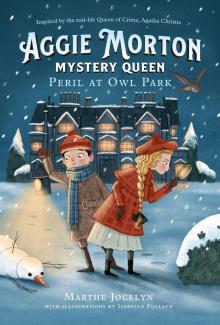 Peril at Owl Park
Peril at Owl Park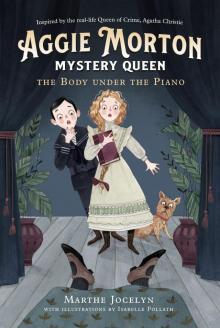 The Body under the Piano
The Body under the Piano Mable Riley
Mable Riley Earthly Astonishments
Earthly Astonishments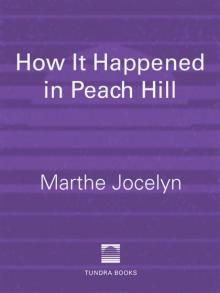 How It Happened in Peach Hill
How It Happened in Peach Hill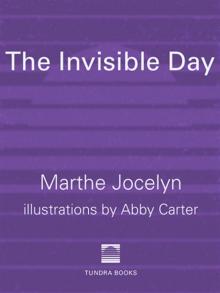 The Invisible Day
The Invisible Day The Invisible Harry
The Invisible Harry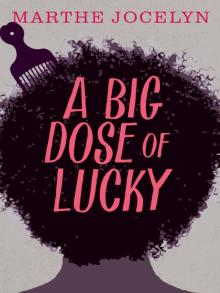 A Big Dose of Lucky
A Big Dose of Lucky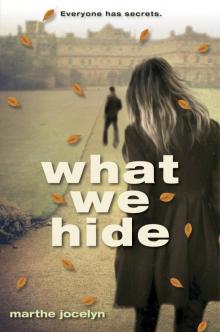 What We Hide
What We Hide Would You
Would You Secrets
Secrets First Times
First Times The Invisible Enemy
The Invisible Enemy Folly
Folly